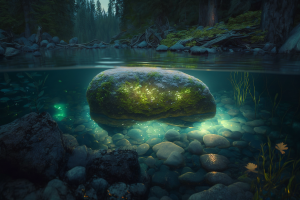Difference between revisions of "Luminifera"
Trismegistus (talk | contribs) m |
Trismegistus (talk | contribs) m |
||
| (5 intermediate revisions by the same user not shown) | |||
| Line 1: | Line 1: | ||
| − | The luminifera are great water-worn boulders that rest in the shallow waters of eastern central [[Pytharnia]]. They are found in small and great profusion in the shallows of [[Lake Kasgo]], [[Lake Thrundgally]], [[Lake Fidogwain]], [[Lake Cailibnecha]], [Lake Gilvanum]], and many others in the surrounding areas of the [[Pytharnian Highlands]]. The boulders are found higher up from the shores of these bodies of water. In both areas, they are of massive size, measuring from about 3 meters (10 feet) to 24 meters (80 feet) in width. They are particularly known for their emission of a soft, glowing light with a slight blue cast during the night and overcast periods of the day, especially the winter. | + | [[File:Luminifera_A_01.png|thumb|300px|Luminifera in the shallows of [[High Pytharnia]]. Midjourney.]] |
| + | |||
| + | The luminifera are great water-worn boulders that rest in the shallow waters of eastern central [[Pytharnia]]. They are found in small and great profusion in the shallows of [[Lake Kasgo]], [[Lake Thrundgally]], [[Lake Fidogwain]], [[Lake Cailibnecha]], [[Lake Gilvanum]], and many others in the surrounding areas of the [[Pytharnian Highlands]]. The boulders are found higher up from the shores of these bodies of water. In both areas, they are of massive size, measuring from about 3 meters (10 feet) to 24 meters (80 feet) in width. They are particularly known for their emission of a soft, glowing light with a slight blue cast during the night throughout the year and overcast periods of the day, especially the winter. While gentle, their luminescence is detectable even under full moonlight. They are understood to absorb sunlight and re-emit it during the absence of the overpowering sunlight, but only when immersed in water. For this reason, they glow in the shallows of water or when drenched by continual rains. They were known from the most ancient times and bear names from several cultures (Kemerite, Neptultchi, Moigthe, Medibgösk, and so forth). The natural, non-glowing appearance of luminifera is soft grey to deep grey. | ||
It is considered a profanation of the local divinities to damage or chip off pieces of the rocks, although due to their immense size, this is not easily done. They are sometimes associated with [[Ogi Gnui]]. In ancient times and today in isolated areas, the common giants of Pytharnia ([[Kemerite Giants]]), would propitiate their shamanic gods and other natural divinities in the presence of these glowing rocks and their shamans considered them a sign of the presence of the gods and suitable for contact with divinities of the water and the moon. | It is considered a profanation of the local divinities to damage or chip off pieces of the rocks, although due to their immense size, this is not easily done. They are sometimes associated with [[Ogi Gnui]]. In ancient times and today in isolated areas, the common giants of Pytharnia ([[Kemerite Giants]]), would propitiate their shamanic gods and other natural divinities in the presence of these glowing rocks and their shamans considered them a sign of the presence of the gods and suitable for contact with divinities of the water and the moon. | ||
| + | |||
| + | The ancient [[Neptultchi]] called them zizimwotxe /ʦiʦiˈmwoʧe/, sometimes spelt 'tzitzimuoche.' | ||
=See Also= | =See Also= | ||
| + | *[[Erri Gnui]] | ||
*[[Lake Kasgo]] | *[[Lake Kasgo]] | ||
| + | *[[Ogi Gnui]] | ||
{{stub}} | {{stub}} | ||
Latest revision as of 17:03, 25 February 2023

The luminifera are great water-worn boulders that rest in the shallow waters of eastern central Pytharnia. They are found in small and great profusion in the shallows of Lake Kasgo, Lake Thrundgally, Lake Fidogwain, Lake Cailibnecha, Lake Gilvanum, and many others in the surrounding areas of the Pytharnian Highlands. The boulders are found higher up from the shores of these bodies of water. In both areas, they are of massive size, measuring from about 3 meters (10 feet) to 24 meters (80 feet) in width. They are particularly known for their emission of a soft, glowing light with a slight blue cast during the night throughout the year and overcast periods of the day, especially the winter. While gentle, their luminescence is detectable even under full moonlight. They are understood to absorb sunlight and re-emit it during the absence of the overpowering sunlight, but only when immersed in water. For this reason, they glow in the shallows of water or when drenched by continual rains. They were known from the most ancient times and bear names from several cultures (Kemerite, Neptultchi, Moigthe, Medibgösk, and so forth). The natural, non-glowing appearance of luminifera is soft grey to deep grey.
It is considered a profanation of the local divinities to damage or chip off pieces of the rocks, although due to their immense size, this is not easily done. They are sometimes associated with Ogi Gnui. In ancient times and today in isolated areas, the common giants of Pytharnia (Kemerite Giants), would propitiate their shamanic gods and other natural divinities in the presence of these glowing rocks and their shamans considered them a sign of the presence of the gods and suitable for contact with divinities of the water and the moon.
The ancient Neptultchi called them zizimwotxe /ʦiʦiˈmwoʧe/, sometimes spelt 'tzitzimuoche.'
See Also
| This article is a stub. It requires further development by the creator. |